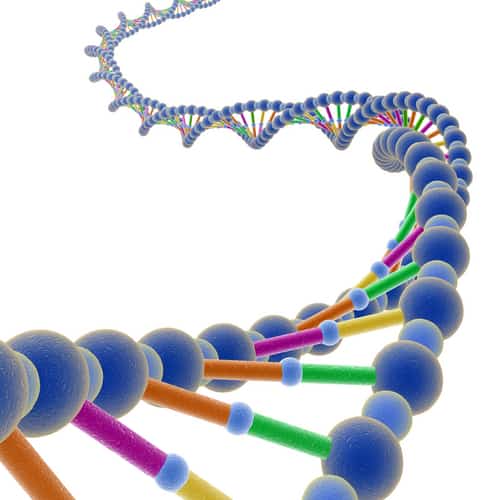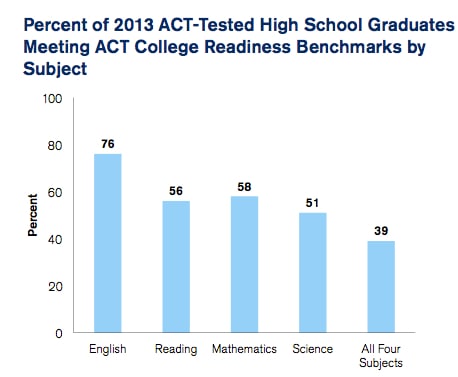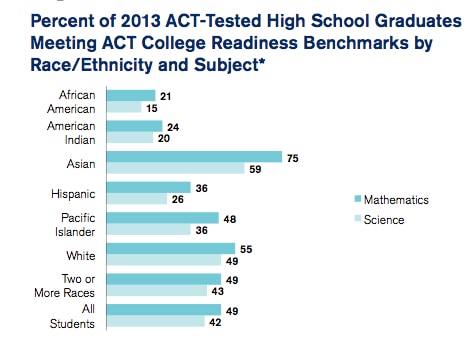
Teenagers often pick college major without knowing much about what they entail or whether they can handle the work.
I was thinking about this today when I read a new report from ACT Inc., entitled, The Condition of STEM 2013. The report shared statistics on the number of high school students in the 2013 graduating class, who were interested in majoring in a STEM (science, technology, engineering and math) discipline and how many students actually were prepared to tackle these tough subjects. I wanted to share some of the STEM report’s findings.
1. According to the ACT report, interest in the STEM majors is high and I assume a lot of it has to do with endless media reports that focus on the majors that generate the highest salaries. Nearly half (48.3%) of all high school grads, who took the ACT, expressed an interest in a STEM major or career.
2. As you can see from the chart below, 2013 high school seniors struggled the most with science while taking the ACT with only 39% of the seniors showing a readiness to do well in college in all four academic areas:
3. Surprisingly, more females than male students expressed an interest in STEMs although the opposite was true among higher-achieving students. Forty six percent of women expressed an interest in STEM majors and occupations of which the largest percent (24%) were interested in nursing (LPN and BS/RN).
4. Students interested in STEM have higher education aspirations and their parents are more likely to have attended college.
5. With the exception of Asian student (61% are interested in STEM), the number of minority students interested in STEM is low, as are their achievement levels in math and science.
6. Many of the students who have expressed an interest in a STEM field are not ready to tackle these subjects in college. In the chart below, you will see how many students, who want to go into a medical or health occupation, are academically prepared in math and science:
Coincidentally, a mom, who is a long-time visitor to my blog, sent me a note about her son, a freshman at a liberal arts college in New York, that focuses on this very topic. Denise sent me her comment in reaction to this college blog post:
Picking A College Major for Money
Heading to college, Denise’s son thought he wanted to be a physician. I believe you’ll appreciate his experience about pursuing this goal and keep in mind that this is a child who is actually prepared mathematically for college:
My son is living your advice as we speak. He started his freshman year of college in August as potential pre-med major. Sounds good to most parents! But it was not his true calling or passion. I was relatively supportive when he chose it, but I think much of his decision was influenced by friends, whose families include doctors, surgeons and so on. He likes the look of that nice life, and the respect it garners. In high school he did well in sciences, but more so chemistry than biology. He has always been what I’d call a math kid, and he enjoyed economics, too.
So, first semester grades (at a private liberal arts school in NY) were not good. I think he was probably overwhelmed with the amount of work of too much science. He dropped his pre-med notions and is continuing with math and some history, poli sci and econ. Time will tell what major he chooses, but he definitely seems happier about his academics.
I am grateful that he discovered this about himself early on, and that he still likes college and his new friends. I told him that it’s all part of the learning process: Know thyself! Better to face it before going down a path of stress and anxiety.
Bottom Line:
What’s important is that high school seniors are prepared academically for the rigors of college. Because of grade inflation, having a great GPA will not indicate whether a teenager is equipped to handle STEM courses in college, which are typically the most challenging you can take.
This is a fear that I had for my son Ben, who had expressed an interest in engineering or physics in high school. Ben was getting “A’s” in his math classes, but I concluded that these courses were too weak and Ben agreed. Consequently, Ben enrolled in a community college math class beginning every semester starting his junior year in high school. It wasn’t easy, but in May Ben will be graduating from Beloit College with a mathematics degree.




I personally am tired of all this STEM talk. I tried engineering per my parents suggestion. I was told it was creative (which I still don’t understand…?) and how afterwards I could do my hobbies on the side. I was really set on getting an engineering degree for the stability. Especially considering how Hispanic women are “in demand”.
I’m a smart gal. I was in several clubs and honor societies in high school. I volunteered every week, either as a tutor or at the local autistic school. My essay for the scholarship I won was written on one go.
But what is the right mindset for an engineer to have? Was it playing with Lego blocks as a child (never did)? Was it have good grades in math and science in high school (I did have)? Was it liking to play with robots (never did)? Was it enjoying the outdoors (yes)?
No one ever answered me, my parents (who never went to college, I may add) just said after high school, “Do engineering and you’ll be fine.”
Now my GPA is suffering because of all the stress two of the four classes (calculus 1 and chemistry) brought. It’s hard to study something already so tedious when everyone else is hammering how this is gonna be your career for the next several decades. I could not have dropped them because my scholarship would have been revoked upon becoming a part-time student. Thankfully I have at least six more semesters to repair the damage,
Quite frankly, I do not care if there’s a “shortage of engineers”, or “more women are needed in STEM.” First of all, why is the low number of women in STEM a big deal, but the low number of men in nursing and teaching, that’s not news worthy? Secondly, I understand engineers make a lot of money, but why does that warrant others to condemn my interests in animation, art, and creative writing?
I hope to find something that will at the very least be tolerable, preferably something that doesn’t require grad school. For my parents sake, I really do wish I liked calculus and chemistry and physics so I could do engineering, but I just can’t. It depresses me how useless my interests are to get a job, how little money I’ll make, but I really do think engineering is more depressing emotioanlly.
Most schools now require all their students to take the ACT test whether they are college bound or not. So, unless the graphs above were based on college bound students, of course the percentages are low. Many high school students are also able to take AP courses which might give a better indication as to whether they are ready for college level courses.